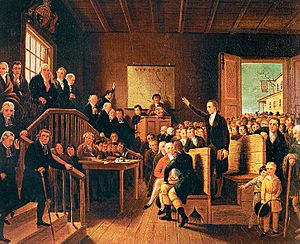Parson's Cause facts for kids
The "Parson's Cause" was an important legal and political argument in the Virginia Colony. Many people believe it was a key event that helped lead to the American Revolutionary War.
This argument was about how church leaders (called clergy) of the Church of England in Virginia were paid. At that time, a lot of tobacco was grown in Virginia. Tobacco was one of the main crops of the colony. In 1748, Virginia passed laws saying that its Anglican church leaders should be paid 16,000 pounds of tobacco each year.
The Problem with Tobacco Pay
In 1758, the tobacco harvest was very bad. Because of this, the price of tobacco in Virginia went up a lot. It jumped from two pennies to six pennies per pound. This meant the church leaders' salaries effectively tripled that year!
Virginia's government had to do something. They passed a law called the Two Pennies Act. This law allowed the government to pay the church leaders with money (called currency) instead of tobacco. It also set a fixed exchange rate: it said that for these payments, the government should count tobacco as being worth two pennies per pound.
King George III of Great Britain did not approve of this law. He used his power to veto (say no to) the law. This made many people in the colony very angry. Many Virginia lawmakers felt the king was overstepping his power by stopping their law.
Patrick Henry Steps Up
Colonel John Henry, who was the father of Patrick Henry, was the judge who oversaw the court case and the jury that decided the issue. Patrick Henry was not very well known at the time. However, he was the person who argued in court for the rights of the colonists.
Reverend James Maury was a church leader who sued in Hanover County Court on April 1, 1762. He was asking for back pay for all the ministers involved. He became the main person representing the British side of the argument.
The court decided on November 5, 1763, that Maury's claim was valid. But a jury still needed to decide how much money he should get. This jury met in December 1763.
A Famous Argument
Patrick Henry became famous by defending Hanover County against Maury's demands. Henry argued strongly in favor of the Two Penny Act. Reverend Maury himself wrote a letter on December 12, 1763, describing what Henry said. Henry argued that "a King, by disallowing Acts of this salutary nature, from being the father of his people, degenerated into a Tyrant and forfeits all right to his subjects' obedience."
This meant Henry was saying that if a king stops good laws that help his people, he stops being a good leader. Instead, he becomes a "tyrant" (a cruel ruler) and loses the right to be obeyed by his people.
The Outcome
The jury listened to Patrick Henry's argument. They decided to award Reverend Maury only one penny in damages. This very small amount basically canceled out the king's veto. After this, no other church leaders sued.
The Hanover County Courthouse is still used today. It is next to the Hanover Tavern, where Patrick Henry lived while arguing the Parson's Cause. It is the third oldest courthouse still in use in the United States. The building was constructed between 1737 and 1742.


